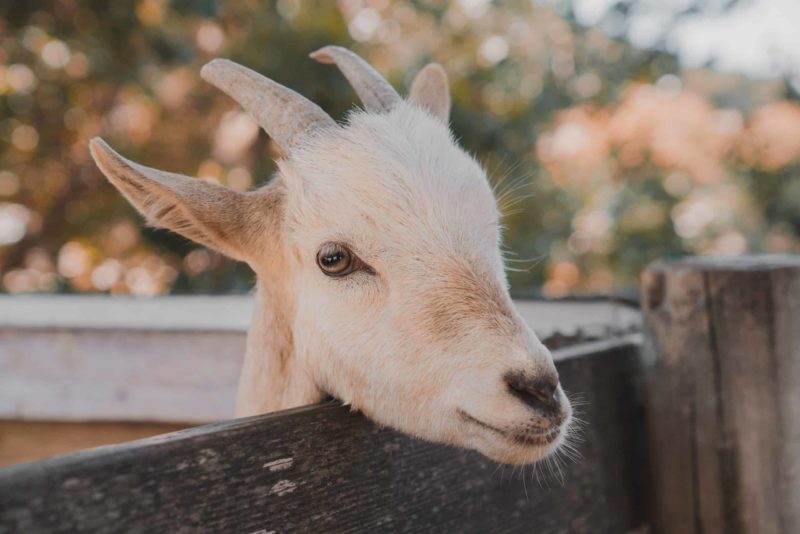
If you spend much time on sanctuary grounds, you likely know that residents have complex and fascinating personalities and quirks. Because many folks have likely never met individuals living out their lives in sanctuary before, we have created a series of resources compiling fun and fascinating facts about residents to share with supporters and the general public. Goats are amazing beings who deserve to be better known!
10 Fun Facts About Goats
- Did you know that goats are more likely to have their ears pointed forward when they are experiencing positive emotions than when experiencing negative emotions? Also, the pitch of their voice is more likely to be steady when feeling positive emotions, whereas it may go up and down more when they are feeling distressed.
- Speaking of voices, studies show that mother goats are able to remember the vocalizations of their kids for at least one year after weaning. That means they probably also remember their voices and monitor how they change as they grow up!
- Want to get on a goat’s good side? Start with smiling! Goats are able to differentiate between happy and unhappy human faces. And they have been found to prefer happy faces!
- Not only can they differentiate between happy and unhappy human faces, but they can also differentiate between different human body postures! In addition, goats can understand where a treat has been hidden by watching what a human points at, or the place they touch!
- Goats are also able to distinguish between the happy and sad calls of other goats. When they hear a sad call, they listen more intently and actually have a physiological response to hearing the sad calls.
- Many humans who care for dogs have witnessed the “puppy dog look” when they have been confronted with an unsolvable problem, such as their ball being stuck under the couch. Individual responses will vary, but some dogs will try to reach it and when they can’t, they’ll turn and look pointedly at their human guardian. Humans will typically perceive this look as, “Help. I can’t get it!” This same behavior has been studied in goats! Research has found that goats will also attempt to solve the problem, and when they can’t they will look to the human to fix the issue!
- Did you know that goats can develop accents? That’s right: The vocalization of kids has been studied, and it was discovered that their voice changes to sound more like the other goats they are with when kept in differentiated social groups!
- As you likely know, goats all have individual personalities. One study found that goats with less exploratory and sociable personality traits are much more likely to perform better when presented with the task of following a hidden object (such as determining which cup has a treat hidden under it). Scientists believe that this may be due to an ability to be less distracted and pay attention longer than other individual goats!
- Goats see purples, blues, and greens best! They can also see oranges and yellows, but are dichromates (red-green colorblind), so can’t distinguish as well between those colors.
- The eyes of goats rotate significantly in their sockets, allowing their pupils to stay aligned with the ground whether their head is up or down!
Hopefully this gives you and your visitors a better idea about the complex and fascinating lives of goats. Did you find any of these fun facts surprising? Or would you like to see a verified fun goat fact added to this list? Let us know!
Infographic: Fun Facts About Goats
Looking to share this information in an accessible way with other sanctuaries and supporters? Check out and share our infographic below!
Fun Facts About Goats by Amber D Barnes
SOURCES:
How Can You Tell If Your Goat Is Happy? Now We Know! | NPR (Non-Compassionate Source)
Mother Goats Do Not Forget Their Kids’ Calls | Proceedings From The Royal Society B (Non-Compassionate Source)
Goats Prefer Positive Human Emotional Facial Expressions | Royal Society Open Science (Non-Compassionate Source)
What Does It Mean When A Goat Gazes Into Your Eyes? | NPR (Non-Compassionate Source)
Individual Personality Differences In Goats Predict Their Performance In Visual Learning And NonAssociative Cognitive Tasks | Animal Studies Repository (Non-Compassionate Source)
‘Goats That Stare At Men’: Dwarf Goats Alter Their Behaviour In Response To Human Head Orientation, But Do Not Spontaneously Use Head Direction As A Cue In A Food-Related Context | Animal Cognition (Non-Compassionate Source)
Goats Distinguish Between Positive And Negative Emotion-Linked Vocalisations | Frontiers In Zoology (Non-Compassionate Source)
The Rich Emotional Lives Of Chimpanzees And Goats | Psychology Today (Non-Compassionate Source)
This Suggests That Goat Kids Modify Their Calls According To Their Social Surroundings, Developing Similar ‘Accents’.” | Phys Org (Non-Compassionate Source)
Goats/Sheep | Evergreen College (Non-Compassionate Source)
If a source includes the (Non-Compassionate Source) tag, it means that we do not endorse that particular source’s views about animals, even if some of their insights are valuable from a care perspective. See a more detailed explanation here.






